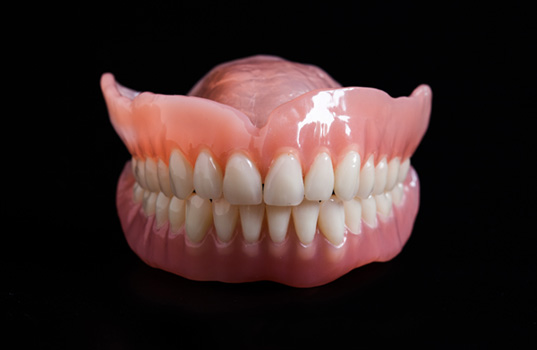Dentures – St. Augustine, FL
Enjoy a Complete Smile Once Again
Tooth loss impacts a lot more than just your appearance. Missing some or all your teeth can take a huge bite out of your quality of life, making it difficult to eat comfortably, speak clearly, and smile confidently. That’s why at Salt Run Family Dental, we’re committed to helping you enjoy a complete smile once again with custom-made solutions like dentures in St. Augustine! Thanks to modern dental technology and materials, this classic restoration is more comfortable and lifelike than ever! Read on to find out why dentures are still one of the most popular ways to replace missing teeth and give us a call today to schedule your consultation!
Why Choose Salt Run Family Dental For Dentures?
- #1 Beautiful Materials for Incredibly Lifelike Results
- #2 Team of Friendly, Highly Experienced Dentists
- #3 100% Custom Treatment for Your Unique Smile
Who’s a Good Candidate for Dentures?

Dentures are an excellent option for those looking for a quick and easy solution for their moderate to severe tooth loss. To ensure you’re a good candidate, we’ll evaluate your oral health before fitting you with dentures. Once any issues like decayed teeth or gum disease have been treated, you’ll be ready to start your journey toward your brand-new smile!
Effects of Missing Teeth

There are a variety of factors that contribute to the progression of tooth loss. They span from tooth decay to gum disease to accidents. According to the American Academy of Periodontology, missing teeth results in a wide array of consequences. Tooth loss can lead to facial sagging, difficulty speaking, difficulty chewing, and low self-confidence. Fortunately, dentures can improve all of these aspects of your life.
What Qualifies You for Dentures?

The vast majority of adults who are missing teeth can get dentures without any issues. They are ideal for people who are missing several, most of, or all of their teeth. People who wear dentures must maintain healthy gum tissue and have sufficient jawbone density. When teeth are missing for a long time, the jawbone is reabsorbed by the body, therefore resulting in bone loss. If you currently have any oral health issues, including gum disease and tooth decay in your existing teeth, these issues will need to be addressed and eliminated before you can get dentures. The health of your smile is always our top priority!
Alternative Tooth Replacement Options

If you aren’t a good candidate for dentures, or they don’t sound like an appealing tooth replacement option for you, you may want to consider the other methods we offer:
- Dental Bridges: A dental bridge works by “bridging” the gap in your smile where your tooth is missing. Bridges are great for those who are only missing a single tooth or a few consecutive teeth. Dental bridges require that the patient has healthy adjacent teeth on both sides of the empty space to surround it.
- Dental Implants: A dental implant is a titanium, screw-like post that is surgically inserted into the jawbone. To be able to get dental implants, it is required that the patient has a sufficient jawbone dentist and is healthy enough to undergo a minor surgical procedure. Dental implants have a higher upfront cost, but they last for multiple decades. You may never have to worry about your missing teeth again.
What Types of Dentures Are Available?

There are several different types of dentures to choose from to accommodate all types of different smiles. Depending on the extent of your tooth loss and your personal preferences, we may recommend:
Partials
Partial dentures (or partials) are a great choice for missing several teeth. This type of denture fits between your remaining healthy teeth like a puzzle piece for seamless results. Small wires and brackets are designed to discreetly wrap around your natural tooth structure for a secure fit.
Full Dentures
Full dentures can replace an entire arch of missing teeth all at once with a single restoration. For this method, an entire set of lifelike replacement teeth are set into a gum-colored acrylic base. This base is precisely crafted to fit snugly on top of your gums, which creates a strong natural suction to hold your new smile in place.
Implant Dentures
As an alternative to traditional removable dentures, you can anchor your new pearly whites into place with an implant denture. This type of denture is attached to four to six implant posts that are placed directly into your jawbone, where they fuse and create an incredibly sturdy and reliable foundation.
How Dentures Are Made

While dentures can effectively restore your full smile, it’s also important to know what you should expect from the treatment. After all, you’ll be wearing your new restorations for most of every day, so it’s good to understand what kind of materials they’ll be made out of. Whether you require partial, full, or immediate ones, each type shares a similar process for their construction. Keep reading to learn how dentures are made in St. Augustine.
What Are Dentures Made Of?

Dentures generally consist of two major components:
- Artificial teeth – The prosthetic teeth will typically be made of resin or porcelain, which are both durable and can mimic the appearance of your natural enamel. Porcelain dentures are some of the most popular choices because they feel incredibly smooth and can go as far as 15 years or more if properly cared for.
- Denture base – This is the foundation for artificial teeth that offers a stable structure to support them. While it matches with the rest of your gum tissue, the material can be fabricated from acrylic, nylon, resin, porcelain, or even metal. That said, most full dentures consist of acrylic due to the material’s ability to blend seamlessly with your natural gum line.
The Denture Creation Process

Getting dentures can take anywhere from several weeks to a few months. To start, your dentist will take impressions of your teeth to be used for creating a mold of your smile. This will allow your final restorations to be constructed in the correct shape and size. The mold will then be sent to a dental lab for fabrication. The prosthetic teeth will be made of acrylic resin (or porcelain) and placed into a wax replica of your gum line that was previously shaped by a technician using a special device. Once the mock-up dentures are made, they’ll be sent to us for approval before we send them back to the lab for the final portion of the process.
A technician will then boil the dentures to remove the wax before being placed in a flask and maintained with plaster. Small holes will be created in the artificial teeth so that they can attach to the gum-colored base. Once the dentures are trimmed, cut, and formed correctly, they’ll come back to us. We’ll call you back into our office to have them fitted. After making any final adjustments and confirming that you’re satisfied with the results, you can feel free to show off and enjoy your full smile again!
Adjusting to Your New Dentures

It’s normal to feel some mild discomfort for several days when first wearing your dentures. This can be due to your gums and mouth having to get accustomed to eating and speaking with your new pearly whites. Thankfully, your mouth should adjust fairly easily to them, and your dentures will feel much more natural over time. Here are several tips to help you speed up this recovery and adjustment process:
- Exercising your facial muscles
- Keeping a soft food diet
- Using denture adhesive to support your restorations
The Benefits of Dentures

Losing permanent teeth can detract from your quality of life because tasks that once were so simple, like eating and speaking, become much more challenging. Thankfully, our team can provide you with lifelike dentures that provide many advantages to restore your abilities and boost your confidence.
Continue reading below to learn more about how you might benefit from this type of restoration, and feel free to reach out for additional information.
Psychological Benefits

Did you know that gaps in your grin can impact your mental and emotional well-being and your oral health? Patients missing adult teeth are more likely to report feelings of anxiety, depression, and a lack of desire to engage socially with others. The changes to your appearance and abilities can leave you self-conscious or concerned that you’ll be judged harshly.
Fortunately, your dentures are fully customized to look just like the teeth that were lost so that you can look and feel like your best self. With them in place, you don’t have to worry as much about standing out for the wrong reasons.
Clearer Enunciation

Your teeth are essential to forming different words because you press your tongue against them to create various sounds. Without a complete set, you could develop a lisp or other issues with your speech patterns.
Dentures function as artificial teeth so that you can communicate more easily. Although it can take about a month for the muscles in your mouth to learn to work around them, you’ll be much more able to enunciate clearly once you do.
Improves Nutrition

It’s not uncommon for patients who have suffered from tooth loss to have gastrointestinal problems or become malnourished. This is because you rely on your teeth to bite into and grind food so that you can easily swallow and digest it. When some or all go missing, you might try to stick to softer foods that are easier to eat but don’t have the same nutritional values.
Your dentures allow you to chew your food so you can enjoy a wider array of health ingredients that support your general health.
Preserves Oral Health

Another common concern when teeth go missing is that any remaining natural ones will shift out of alignment to fill the spaces left behind. This can wear down your enamel prematurely, increasing the likelihood of damage or decay, and can also contribute to temporomandibular joint disorders (TMD).
Thankfully, this can be prevented by wearing your prosthetics every day. They fill in the empty spaces to ensure that your teeth remain in their proper places to preserve your dental health.
Expands Opportunities

Your smile plays a pivotal role in making positive first impressions. In fact, according to a 2019 study, the probability of being employed is negatively associated with poor oral health. If you have an upcoming job interview, romantic encounter, or other significant event, looking and feeling your best is important.
Dentures are made to look and feel as natural as possible so that your natural confidence can shine through, increasing the likelihood of success!
Understanding the Cost of Dentures

You don’t need to live with the challenges of tooth loss because you’re worried about the cost of dentures in St. Augustine. We offer the cost-effective solutions you need to revamp your smile and self-esteem without breaking the bank. Although there isn’t a set fee for dentures, we’ll create a personalized plan that meets your needs and budget for high-quality, natural-looking replacement teeth.
Factors that Affect the Cost of Dentures

Every patient’s needs are unique, which is why there isn’t a flat fee for dentures in St. Augustine. We don’t believe in cookie-cutter treatment plans because we want to ensure you’re completely satisfied with your new teeth. After performing an initial consultation to examine your smile and learn more about your goals, we’ll provide you with an estimate and discuss the costs, which can include:
- Preparatory work, like periodontal therapy or tooth extractions.
- Number of arches being treated
- Materials used
-
Type of denture
Although everyone likes to save money, you shouldn’t pinchpennies when investing in dentures. While you’ll find many discounted materials, you’ll pay the price in terms of comfort, durability, and aesthetics. We’ll help you choose the best materials to ensure your new teeth closely look and feel natural.
Are Implant Dentures More Expensive?

Yes, dental implants are initially more expensive than traditional dentures but for good reason. Titanium posts are surgically inserted into the jawbone to anchor your denture in place. With the posts serving as roots, they will keep your jawbone strong to improve your oral health to reduce your long-term costs for care. Not to mention, you will never have to worry about slipping or irritation again because an implant denture is a nearly perfect recreation of your real smile. Best of all, dental implants can last for decades, so you’ll save money down the road.
Does Dental Insurance Cover Dentures?

Every dental insurance policy differs, but most plans offer coverage for dentures. After reaching your annual deductible, you can use your benefits to offset the amount you need to pay out-of-pocket. The amount covered varies depending on your specific policy, which is usually around 50% to 80%. We will work on your behalf with your dental insurance to maximize your benefits to keep your dentures affordable.
Other Options for Making Dentures Affordable

We don’t want finances standing in the way of replacing your missing teeth. Your denture dentist in St. Augustine offers several solutions to pay for your treatment. Besides using your dental insurance, we also accept:
- Traditional Payment Methods: We accept cash, check, and most major credit cards.
- CareCredit: Based on credit approval, you’re given the funds you need, which you’ll repay using a plan that accommodates your budget.
- Dental Implant Payment Plan: We accept monthly payment options for single dental implants.
We are transparent about our fees, so you’ll know exactly what you’ll need to pay before committing to a treatment. Rest assured; you won’t be caught off guard by any hidden expenses for a stress-free journey to a complete smile.
Denture Aftercare

When you first get dentures, it’s easy to think your oral troubles are over. The new teeth, after all, are artificial and won’t suffer decay or cavities. However, you’ll still require dental care in the future. Dentures won’t function without regular maintenance and good oral health. So, it’s crucial that you visit your dentist often and practice solid oral habits. Luckily, Salt Run Family Dentistry can help you with caring for dentures. To learn more, keep reading or call us for the details.
Removeable Dentures

Remove After Eating
Firstly, remember to remove and rinse your denture after meals. Like regular teeth, prosthetic ones collect food debris and bacteria over time. Therefore, post-meal rinses will keep this gunk from building up too much.
That said, don’t use hot water for the rinses. Heat can warp denture material and cause the restorations to fit poorly. Should the latter scenario happen, the dentures won’t work well and may need replacement.
Clean Your Restoration
At least once per day, remove your dentures to clean them. You’ll raise your risk of oral health problems if you don’t.
It’s best to use a soft-bristled toothbrush and soap for this cleaning. Standard toothpaste isn’t good for dentures, as its abrasiveness can damage the restorations. If it’s available, however, you can substitute denture cleanser for the soap.
If you don’t wear the dentures right after cleaning, try placing them in a container of cleansing solution. That way, they won’t dry out or lose shape. Rinse the dentures afterward, though, since the cleanser isn’t intended to be in the mouth.
Keep Your Dentures Safe
Since dentures are fragile, you’ll need to keep them safe. They could easily break otherwise.
One option is to keep a towel handy during cleaning. Placing the item beneath your dentures will cushion them in case of a fall.
Another method is to store dentures away from kids or pets. Those two groups, naturally, could find the restorations and damage them.
Remove Dentures When You Sleep
When you go to bed, store your dentures in a glass of soaking solution. Sleeping with them in your mouth leads to oral health issues.
You see, wearing dentures normally restricts the circulation in your gums. If you sleep with them overnight, that restriction will further lead to soft tissue irritation. You don’t want red and sensitive gums, right?
Besides, using these prosthetics for too long is unsanitary. Sleeping with dentures, you see, is associated with a higher risk of pneumonia and gum or tongue plaque.
Notice Changes
When adjusting to your dentures, watch for changes in them or your mouth. Not doing so could lead to untreated issues in your prosthetics.
In particular, contact your dentist at once if the dentures fit poorly. Leaving the restorations alone could cause mouth sores or gum irritation. A dental provider, meanwhile, could refit, reline, or replace them before such things happen.
Dentures FAQs

Reading through the above information can give you valuable insight into the types of dentures in St. Augustine, who is a candidate, and the benefits of this smile-rebuilding service. If you are ready to schedule your initial consultation, then don’t hesitate to get in touch with us so we can help you take the next step toward your new and improved smile. However, if you have a few questions you’d like answered first, that’s okay too! That’s why we’ve responded to some of the most frequently asked questions we hear from patients below.
Is It Hard to Talk with Dentures?
When you first get your dentures, it’s natural to experience a bit of a learning curve. Fortunately, you can speed up the process by reading aloud and practicing the more difficult words (like “sixty”) repeatedly. It is also important to be patient and focus on speaking slowly at first. As you develop your proficiency, you’ll be able to speak faster without compromising clarity. Lastly, make sure to bite down and swallow before you begin talking, which will ensure your dentures are in the proper position and excess saliva doesn’t muddle your speech.
Will It Hurt to Get Dentures?
If you are getting a few teeth extracted beforehand, then you may experience some soreness in the days following your procedure. Fortunately, getting plenty of rest, placing a cold compress against the outside of your cheek, and taking your prescribed pain medication as directed will help keep you comfortable. After you’ve healed completely, you’ll be given your dentures. Some minor irritation is common, but it typically subsides within a few months. If the pain persists after that, then make sure to get in touch. That way, we can see if there is an underlying oral health issue that needs to be addressed.
What Can’t You Eat with Dentures?
Although dentures are crafted from incredibly durable materials, certain foods can pull and tug at them. Therefore, it’s a good idea to stay away from gummy candies, peanut butter, and gum. Hard items, like ice, popcorn, and shelled nuts are also not recommended. Instead, try sticking to soft, but equally as delicious, foods, like mashed potatoes, scrambled eggs, and oatmeal.
How Should I Care for My Dentures?
Like your natural teeth, your dentures require some maintenance. Some of the most important best practices to follow include brushing and flossing your natural teeth daily. You should also prioritize your six-month dental checkups and cleanings, which will help keep your oral health in pristine condition. As for the dentures themselves, you should soak them daily in a special cleaning solution and brush them regularly with a soft-bristled toothbrush. Adjustment appointments are also necessary to ensure they continue to fit snugly against your gums throughout the years.
